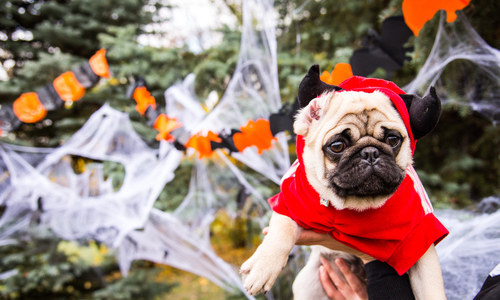Tips For Safe and Comfortable Pet Costumes
Safety is an important consideration if your pet will be dressing up for Halloween or another festive occasion this year. Keeping these recommendations in mind when you shop will help you ensure that the costume you choose is safe and comfortable for your companion.
Costumes Should Allow Your Pet to Move Freely
Can your pet walk, run, jump, sit, and move normally when wearing the costume? If not, it may be best to keep shopping. Look for costumes made of soft, stretchy material that moves with your furry friend. Be sure to put the costume on your pet before the big day. If it restricts your pet’s mobility or doesn’t fit well, you’ll have plenty of time to find a better choice.
Although costumes should allow plenty of room for movement, make sure they aren’t too big or loose. Loose or large costumes may pose tripping hazards.
Stay Away from Flammable Materials
Costumes made with synthetic materials are more likely to catch fire than those made of natural fibers. If a fire does occur, your pet may try to run in an attempt to escape the blaze, increasing the risk of severe burns.
Reading the tags or online product descriptions for all of the costumes you’re considering can help you avoid inadvertently selecting a highly flammable costume.
Make Sure Masks and Hats Fit Well
Masks, hats, wigs, and headbands can interfere with vision if they’re not the right size for your pet. Make sure eye holes on masks are large enough to allow your pet to see in all directions. Poorly fitting hats, headbands, headpieces, or wigs can drift into your cat or dog’s field of vision, making it difficult to spot obstacles. Make sure these items fit your pet snugly to avoid vision problems. Avoid masks that cover your pet’s nose and make it hard to breathe.
Look for Choking Hazards
Dangly decorations, buttons, and elaborate trim make any costume look more authentic but can pose a choking risk. If your pet is a chewer, it may be best to bypass these types of costumes. In addition to triggering choking, swallowed decorations might damage your pet’s stomach or intestines.
Choose Costumes That Can Accommodate Leashes and Harnesses
Parties and celebrations can be a little overwhelming for some pets, particularly if other people and animals are wearing costumes. If your pet tries to run away from a spooky witch or scary clown, a harness or leash will prevent him or her from dashing into the street or disappearing into the bushes.
The ASPCA recommends that pets wear identification tags when in costume. ID tags are a good idea even if your pet is microchipped. Good Samaritans who find your pet won’t have microchip scanners, which could delay your reunion with your dog or cat.
Make Sure Your Pet’s Costume Can Be Seen in the Dark
That black vampire costume may be a hazard if your pet will be outside when it’s dark. Choose costumes that contain bright colors or include reflective trim and materials if you’ll be spending time outdoors in the evening.
Be Patient
Your cat or dog may not like wearing a costume at first. Place the costume on your pet for a few minutes initially, then gradually increase wearing time. If your pet is obviously unhappy, fearful or anxious, or tries to bite and tear the costume, it may not be the best option. Try another costume, or buy your pet a decorated collar or bandana instead. Collars and bandanas offer a festive touch and are well tolerated by many pets.
If your pet doesn’t like dressing up, consider a more creative approach. Pulling your pet in a small decorated wagon may be a better option than forcing your cat, dog, or small animal to wear a costume.
Do you have a few questions or concerns about your pet’s physical or mental health? Contact our office to schedule your furry friend’s appointment.
Sources:
ASPCA: Tips on Costumes, Candy and Celebrating Safely with Your Pets This Halloween, 10/26/16
The Humane Society of the United States: Halloween Safety Tips for Pets
American Kennel Club: 10 Tips for Dressing Up Your Dog Safely, 10/26/16

